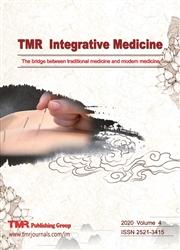Unlocking the potential: integrating traditional Chinese medicine and modern technology for enhanced cancer treatment strategies
引用次数: 0
Abstract
Based on the unique therapeutic advantages of traditional Chinese medicine (TCM) and its integration with modern scientific technology, the exploration of more effective strategies for cancer treatment holds great significance. The utilization of TCM in modern applications and the selection of drugs and drug delivery systems for cancer treatment demonstrate promising potential. In accordance with TCM theory, a strong spleen and stomach support the overall well-being of the five zang organs. During cancer treatment, TCM often reinforces healthy Qi (Qi refers to the basic substance that constitutes the human body and maintains life activities, and is the unity of substance and function) to eliminate pathogenic factors, safeguard the spleen and stomach, and strengthen vital Qi. This approach aims to remove toxins and regulate and harmonize the balance of Qi, blood, Yin (in Chinese philosophy, the female, latent, passive principle, characterized by dark, cold, wetness, passivity, disintegration, etc.), Yang (in Chinese philosophy, the masculine, active and positive principle, characterized by light, warmth, dryness, activity, etc.), and organ functions. Many scholars have incorporated TCM into adjuvant chemotherapy regimens for cancer patients with the hope of effectively inhibiting tumor growth, promoting apoptosis of tumor cells, regulating patients’ immune responses, mitigating adverse effects of chemotherapy, and reducing the risk of tumor recurrence. Additionally, individualized TCM formulations, tailored to patients’ constitutional and disease characteristics, synergistically combine modern spectrum-based anticancer Chinese herbs. Reinforcement and elimination in combination and therapy with syndrome differentiation, these formulations stimulate positive factors within the body, enhance immune function, fortify the body’s resistance, and improve patients’ quality of life. In the context of modern medical advancements, an increasing number of active compounds from TCM have been identified for their potent anti-tumor activities. These compounds intervene in critical signaling pathways, exhibiting noticeable inhibitory effects on tumor progression. The selection of drug delivery systems is paramount in determining the efficacy of cancer treatment. Hydrogel systems, functioning as reservoirs for drugs, enable controlled and sustained drug release, enhance drug accumulation at target sites, minimize drug circulation, and reduce required drug dosages, thereby decreasing systemic exposure and toxicity. Hydrogels with superior mechanical characteristics and biocompatibility are more easily absorbed by the body. The application of hydrogel-based local drug delivery at tumor sites holds extensive promise. Numerous hydrogels with excellent biocompatibility and degradability have been widely utilized in tissue engineering, biomedicine, and other domains, displaying outstanding drug-loading capabilities and anticancer activities. Contemporary research underscores the synergistic potential of combining TCM with Western medicine, achieving enhanced therapeutic effects with reduced toxicity. Simultaneously, the effective integration of active ingredients from traditional Chinese herbs with modern molecular targeted drugs, coupled with advanced pharmaceutical formulation techniques, facilitates the development of novel drug delivery systems and treatment regimens, offering more effective options for cancer therapy. Such approaches yield significant benefits in mitigating adverse reactions from radiotherapy and chemotherapy, regulating patients’ immune functions, preventing recurrence and metastasis, and extending patient survival.释放潜能:结合传统中医与现代科技,提升癌症治疗策略
基于中医独特的治疗优势,结合现代科学技术,探索更有效的癌症治疗策略具有重要意义。中医药在癌症治疗中的现代应用和药物选择及给药系统显示出巨大的潜力。根据中医理论,强健的脾胃可以支撑五脏的整体健康。在癌症治疗过程中,中医经常强化正气(气是指构成人体和维持生命活动的基本物质,是物质和功能的统一),以消除致病因素,保脾胃,增强正气。这种方法旨在排除毒素,调节和协调气、血、阴(在中国哲学中,女性、潜伏、被动原则,以暗、冷、湿、被动、分解等为特征)、阳(在中国哲学中,男性、主动、积极原则,以光、热、干、活动等为特征)和器官功能的平衡。许多学者将中医药纳入癌症患者的辅助化疗方案,希望能有效抑制肿瘤生长,促进肿瘤细胞凋亡,调节患者免疫反应,减轻化疗不良反应,降低肿瘤复发风险。此外,根据患者体质和疾病特点量身定制的个体化中药配方,将现代抗癌中草药协同结合。补消结合,辨证论治,激发体内积极因子,增强免疫功能,增强机体抵抗力,提高患者生活质量。在现代医学进步的背景下,越来越多的中药活性化合物被发现具有有效的抗肿瘤活性。这些化合物干预关键的信号通路,对肿瘤进展表现出明显的抑制作用。药物输送系统的选择是决定癌症治疗效果的关键。水凝胶系统作为药物储存库,能够实现药物的可控和持续释放,增强药物在靶点的蓄积,最大限度地减少药物循环,减少所需的药物剂量,从而降低全身暴露和毒性。水凝胶具有优越的机械特性和生物相容性,更容易被人体吸收。基于水凝胶的局部给药在肿瘤部位的应用具有广泛的前景。许多具有良好生物相容性和可降解性的水凝胶被广泛应用于组织工程、生物医学等领域,表现出优异的载药能力和抗癌活性。当代研究强调了中西医结合的协同潜力,可以在降低毒性的同时提高治疗效果。同时,传统中药的有效成分与现代分子靶向药物的有效结合,加上先进的药物配方技术,促进了新型药物传递系统和治疗方案的发展,为癌症治疗提供了更有效的选择。这些方法在减轻放化疗不良反应、调节患者免疫功能、防止复发和转移、延长患者生存期等方面具有显著的益处。
本文章由计算机程序翻译,如有差异,请以英文原文为准。
求助全文
约1分钟内获得全文
求助全文

 求助内容:
求助内容: 应助结果提醒方式:
应助结果提醒方式:


